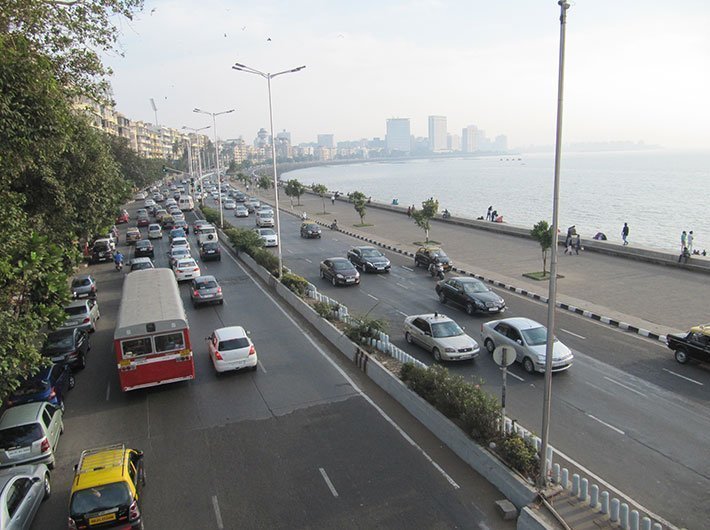Mumbai, the second largest city in the country, is not very inclusive when it comes to the easy access to the disabled, but it is learning and is in the process of making the life of Divyangs easier. Also, it aims to rehabilitate all slums in five years.
Stakeholders came together to discuss on how to make the city inclusive at a panel discussion on the topic, “Mumbai is slated to be a megacity; how can we best achieve the sustainable development goals and not leave anyone behind with regards to gender, disability, equality?” held at the Kala Ghoda Arts Festival last week.
Suhas V Karnik, secretary, National Association for The Blind, said that public amenities should be barrier-free and easily accessible. “We need to be able to follow the principles of town planning, universal design etc., and that is really lacking this juncture.” Lamenting that buildings are really not accessible, Karnik said that he depends on the provisions of the Rights of Persons with Disability Act 2016. “Since 2016 there is a backlog of 2% budget allocation spending on the disabled. While it is statutory to modify the existing infrastructure within five years of the passage of the law, much needs to be done. Specifically, transportation for a person with major disability is not accessible”.
Sharing his Sweden experience, he recalled the disable-friendly transport of that country including low-floor buses and low-height footpaths where people with disabilities can easily access public infrastructure.
Terming the Navi Mumbai Municipal Corporation a model municipality, Karnik said that the corporation has fully utilized 5% of the municipal budget allocated for disabled and made cities like Vashi disabled-friendly and fully accessible. He also emphasized the need for an audit and said that access audit must be conducted with the help of stakeholders.
Sangita Hasnale, assistant commissioner planning, Municipal Corporation of Greater Mumbai, said that that since last year MCGM has created a special budget for specially abled persons. Listing out measures adopted by MCGM for specially abled people she said that to begin with the civic body has in G North ward created a special disabled-friendly footpath, all public and private MCGM toilets and lifts have been made disabled-friendly. The MCGM website is inclusive too. Last year MCGM distributed 288 modified scooters for disabled-friendly needs. This year 365 people have been identified who are eligible for such scooters. She added that 332 photocopy machines were distributed last year and this year too an equal number will be handed over. Five percent galas on streets are reserved for Divyang (disabled). Mumbai at present has 1,995 stalls which will be upgraded to disabled-friendly free of cost.
Hasnale said that every sector will have a Divyang cell and all concerned schemes will be implemented. She urged all Divyangs in Mumbai and those coming from outside to meet their concerned ward officers and enroll themselves in their wards.
Listing out other measures undertaken by the MCGM to make the city safer she said that under the Nirbhaya scheme along with Mumbai police and electricity companies, during August-September 2019, 165 spots without electricity were identified. Electricity at 122 spots has already been provided and work on other sites is on. Besides the Savitribai Phule Gender Resource Centre, women shelters and night shelters have been opened. She also informed that the number of the homeless in Mumbai city has reduced from 56,000 as per the 2011 census to 11,000 as per a current survey. Hawkers too are being registered and being provided identity cards.
“Unlike Navi Mumbai, Mumbai city is unplanned and has space constraints. It is the first city in India to have an SRA (Slum Rehabilitation Authority),” said Hasnale. She acknowledged that despite having the Development Plan (DP) it was only used for building proposal department or roti, kapada, makaan. “Not any more. It now also means having reservations and providing women’s hostels, old-age homes etc. In the first five years we are developing all vacant land in our possession and in the next five years we will take possession of our lands not with us at present and involve public participation for their development. MCGM is working towards a slum-free Mumbai in the next few years,” she said.
Pratima Manohar of Urban Vision said that policies should make cities more inclusive and emphasized on collaborative, participatory problem solving instead of pinning the blame on government. “We will have to redistribute governance in the hands of people,” she said.
Anna Lekvall, Sweden’s Consul General in Mumbai who was also part of the panel, said that her country has been much focused on improving accessibility to people with disabilities. It has made transport and schools accessible so that people with disabilities can run more and more.” Especially in the area of smart cities, Sweden and India are cooperating and engaging with each other on innovation and transportation issues, she said.



